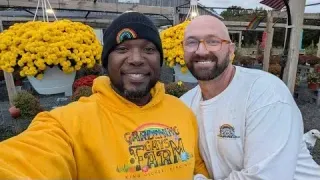
Nov 6
Jaxon Feeley’s “Fear Proof”: Doing It Scared and Rewriting the Rules of Queer Courage
READ TIME: 4 MIN.
When was the last time someone handed you a book that felt less like a lecture and more like a late-night pep talk from your fiercest, most vulnerable friend? Enter Jaxon Feeley—a trans man, former prison officer, and motivational speaker—whose debut “Fear Proof” is already being heralded by queer circles as not just a manual, but a lifeline for those navigating the tangled territory between fear and freedom.
Feeley doesn’t ask us to be fearless—in fact, he doesn’t believe in the myth. Instead, he invites us to “do it scared,” a phrase that lands with particular resonance for LGBTQ+ folks who know what it means to step out, speak up, and sometimes, simply survive. This is a book for anyone who’s ever felt the ground shake beneath their identity, who’s waited for permission to begin again.
Feeley’s story is not one of easy victories. Before he became a beacon for trans visibility, he was “absolutely ready to die if I didn’t do that,” referring to his transition—a raw admission that many in our community will find heartbreakingly familiar. His journey took him from the ranks of the military to the halls of His Majesty’s Prison Service, all while battling the suffocating weight of living as someone he wasn’t.
“I was looking at myself and I was thinking, ‘I don’t want to die, but I don’t want to live anymore,’” Feeley shares, cutting through the noise of toxic positivity that often surrounds queer coming out stories. The decision to transition was not about chasing happiness, but about survival.
And yet, Feeley’s story is also one of unexpected joy. He describes the past eighteen months post-transition as “the best, most terrifying, but the best 18 months of my life”—a messy, beautiful contradiction that will feel familiar to anyone who’s ever chosen authenticity over safety.
In a personal growth market flooded with recycled mantras and questionable credentials, “Fear Proof” stands out because it’s not just about being trans—it’s about being human. Feeley decodes fear not as a distant monster, but as a constant hum beneath our daily decisions—whether it’s changing pronouns, coming out to family, or deciding to wear the dress or the suit.
His framework is gentle, not prescriptive. There are exercises—yes—but they’re more about sitting in silence, reflecting on your truth, and finding the courage to take the next step, no matter how small. Feeley’s refusal to “polish the pain” gives readers permission to show up messy, scared, and unfinished. He insists that growth is available to anyone willing to begin again, even when the ground is still shaking.
Queer readers will recognize themselves in Feeley’s insistence that visibility isn’t just about being seen—it’s about being seen *scared*, being seen *uncertain*, and being seen *in progress*. For trans and non-binary people, especially those who feel isolated by mainstream narratives, “Fear Proof” is a companion whispering, “You’re not alone, and you don’t have to wait until you’re ‘ready.’”
The book’s dedication—“To Little Jess—who never gave up”—is more than a sentimental line. It’s a rallying cry for every queer kid who’s told themselves to hang on until tomorrow. Feeley’s narrative, threaded with empathy and quiet defiance, invites us to honour our past selves, to resist the urge to erase the pain, and to celebrate survival as an act of rebellion.
This matters, especially now, as trans communities face renewed scrutiny, backlash, and legislation aimed at curtailing rights and visibility. Feeley’s experience working in environments where masculinity is currency—military, prisons, sports teams—adds layers to his understanding of what it means to be seen as “other,” and why queer resilience must be both individual and collective.
As Feeley puts it, “When it feels scary to jump, you jump.” For LGBTQ+ readers, this isn’t abstract philosophy—it’s our daily reality.
“Fear Proof” lands at a time when the call for authentic queer stories has never been louder. Feeley’s refusal to sanitize his journey, his willingness to talk about mental health, and his invitation to “do it scared” offer a desperately-needed counter-narrative to rainbow-washed corporate pride and sanitized coming-out tales.
Queer culture thrives in the messy middle—at the intersection of fear and ferocity, shame and celebration. Feeley’s book belongs on the same shelf as memoirs by Janet Mock and Travis Alabanza, but carves its own lane by blending lived experience with practical advice and scientific insight.
It’s impossible not to feel moved by Feeley’s honesty, his refusal to polish the pain, and his insistence that growth is possible for anyone willing to begin again—even when the ground beneath them still shakes.
At its core, “Fear Proof” is an invitation to every LGBTQ+ person: You don’t have to wait for fear to disappear before you act. You don’t have to wait to be “fearless.” You can do it scared. And that, Feeley reminds us, is how revolutions—personal and political—actually begin.
The book is available in paperback and Kindle, but its true legacy will be carried in the conversations, the DM threads, and the late-night texts between queer friends who are finally ready to jump—not because it’s safe, but because it’s necessary.
In a world that wants us polished, Feeley gives us permission to show up raw, real, and radically ourselves. And for that, the queer community—scared, proud, and utterly unstoppable—owes him a debt of gratitude.






